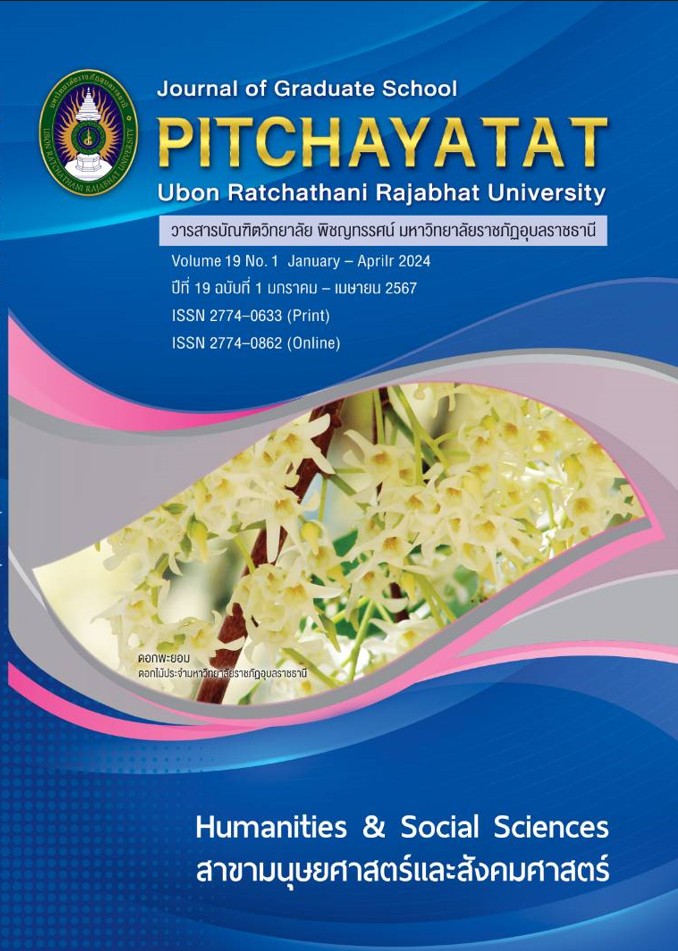การบริหารองค์การและจิตวิทยาองค์การที่ส่งผลต่อการเป็นองค์การแห่งการเรียนรู้ของธนาคารเพื่อการเกษตรและสหกรณ์การเกษตร ในเขตพื้นที่จังหวัดอุบลราชธานี
คำสำคัญ:
การบริหารองค์การ , จิตวิทยาองค์การ , องค์การแห่งการเรียนรู้บทคัดย่อ
การวิจัยนี้มีวัตถุประสงค์เพื่อ 1) ศึกษาการบริหารองค์การและจิตวิทยาองค์การที่ส่งผลต่อการเป็นองค์การแห่งการเรียนรู้ของธนาคารเพื่อการเกษตรและสหกรณ์การเกษตร 2) เปรียบเทียบปัจจัยส่วนบุคคล จำแนกตาม เพศ อายุ ระดับการศึกษา ประสบการณ์ทำงาน อัตราเงินเดือนและตำแหน่งงาน กับความเป็นองค์การแห่งการเรียนรู้ของธนาคารเพื่อการเกษตรและสหกรณ์การเกษตร ในเขตพื้นที่จังหวัดอุบลราชธานี ตัวอย่าง ได้แก่ พนักงานธนาคารเพื่อการเกษตรและสหกรณ์การเกษตรในเขตพื้นที่จังหวัดอุบลราชธานี จำนวน 234 คน ได้มาโดยการสุ่มตัวอย่างแบบสะดวก เครื่องมือที่ใช้ ได้แก่ แบบสอบถาม สถิติที่ใช้ ได้แก่ ร้อยละ ค่าเฉลี่ย ส่วนเบี่ยงเบนมาตรฐาน การวิเคราะห์ถดถอยพหุคูณ และเปรียบเทียบระดับความคิดเห็นเกี่ยวกับองค์การแห่งการเรียนรู้ของธนาคารเพื่อการเกษตรและสหกรณ์การเกษตร โดยใช้สถิติทดสอบที สถิติทดสอบเอฟ
ผลการวิจัยพบว่า
- การบริหารองค์การและจิตวิทยาองค์การที่ส่งผลต่อการเป็นองค์การแห่งการเรียนรู้ของธนาคารเพื่อการเกษตรและสหกรณ์การเกษตรพบว่า ตัวแปรพยากรณ์ทั้ง 11 ตัวแปร มีค่าสัมประสิทธิ์สหสัมพันธ์ภายในและมีความสัมพันธ์กับการเป็นองค์การแห่งการเรียนรู้ 8 ด้าน ได้แก่ ด้านผู้นำ ด้านวิสัยทัศน์ พันธกิจ และยุทธศาสตร์ ด้านการจัดการความรู้ ด้านการพัฒนาบุคลากรและทีมงาน ด้านการนำเทคโนโลยีมาใช้ ด้านโครงสร้างการบริหารงาน ด้านการเสริมแรงและด้านการเรียนรู้ โดยการบริหารองค์การและจิตวิทยาองค์การทั้ง 8 ด้าน สามารถร่วมกันทำนายการเป็นองค์การแห่งการเรียนรู้ ได้ร้อยละ 82.00
- พนักงานธนาคารเพื่อการเกษตรและสหกรณ์การเกษตร ในเขตพื้นที่จังหวัดอุบลราชธานีที่มีเพศ อายุ ระดับการศึกษา ประสบการณ์ทำงาน อัตราเงินเดือนและตำแหน่งงานต่างกัน มีความคิดเห็นเกี่ยวกับองค์การแห่งการเรียนรู้แตกต่างกันอย่างมีนัยสำคัญทางสถิติที่ระดับ .05
เอกสารอ้างอิง
กฤติญา ศรซังส้ม. ปัจจัยที่ส่งผลต่อการเป็นองค์การแห่งการเรียนรู้ของสถานศึกษาสังกัดสำนักงานเขตพื้นที่การศึกษาประถมศึกษาชลบุรี เขต 2. วิทยานิพนธ์ครุศาสตรมหาบัณฑิต มหาวิทยาลัยราชภัฏราชนครินทร์, 2564.
ไชยสิทธิ์ ปิยมาตย์. ปัจจัยที่ส่งผลต่อการเป็นองค์การแห่งการเรียนรู้ของโรงเรียนเหล่าสายวิทยาการของกองทัพบก. วิทยานิพนธ์ปรัชญาดุษฎีบัณฑิต มหาวิทยาลัยศรีปทุม, 2556.
ธนาคารเพื่อการเกษตรและสหกรณ์การเกษตร. รู้จัก ธ.ก.ส. (ออนไลน์) (อ้างเมื่อ 14 มีนาคม 2566). https://www.baac.or.th/th/content-about.php?content_group_sub=0023.
นครินศร์ จับจิตต์. ปัจจัยที่มีอิทธิพลต่อองค์กรแห่งการเรียนรู้ในสถานศึกษาสังกัดสำนักงานเขตพื้นที่การศึกษาประถมศึกษาพระนครศรีอยุธยา. วิทยานิพนธ์ครุศาสตรมหาบัณฑิต มหาวิทยาลัยราขภัฏวไลอลงกรณ์, 2562.
นภาพร หัสไทรทอง. แนวทางการพัฒนาองค์การแห่งการเรียนรู้ของสำนักงานปลัดกระทรวงศึกษาธิการ. วิทยานิพนธ์บริหารธุรกิจมหาบัณฑิต มหาวิทยาลัยราชภัฏนครปฐม, 2562.
นันทวัฒน์ พรเลิศกชกร. การบริหารจัดการตามแนวคิด 7S ของแมคคินซีย์ที่มีอิทธิพลต่อการเป็นอง์การแห่งการเรียนรู้ของธุรกิจโรงแรมในประเทศไทย.ดุษฎีนิพนธ์ปรัชญาดุษฎีบัณฑิต มหาวิทยาลัยสยาม, 2565.
นิษฐ์อติกานต์ ดาราพันธ์. ปัจจัยทางการบริหารและองค์การแห่งการเรียนรู้ที่ส่งผลต่อประสิทธิผลของโรงเรียนในสังกัดสำนักงานเขตพื้นที่การศึกษาประถมศึกษามุกดาหาร. วิทยานิพนธ์ครุศาสตรมหาบัณฑิต มหาวิทยาลัยราชภัฏสกลนคร, 2560.
ปิยะณัฐ เกียงประสิทธิ์. ปัจจัยที่มีอิทธิพลต่อการเป็นองค์กรแห่งการเรียนรู้ ของบุคลากรที่ปฏิบัติงานในกลุ่มธุรกิจขนส่งและโลจิสติกส์ในประเทศไทย. วิทยานิพนธ์บริหารธุรกิจบัณฑิต มหาวิทยาลัยนานาชาติแสตมฟอร์ด, 2560.
ประกาย ศิริสำราญ. ปัจจัยที่ส่งผลต่อการเป็นองค์การแห่งการเรียนรู้ของบุคลากรมหาวิทยาลัยราชภัฏบุรีรัมย์. วิทยานิพนธ์บริหารธุรกิจมหาบัณฑิต มหาวิทยาลัยราชภัฏนครราชสีมา, 2562.
พรฑิตา อังกินันทน์. แนวทางการพัฒนาองค์การประเภทธุรกิจธนาคารสู่องค์การแห่งการเรียนรู้ กรณีศึกษา ธนาคารกรุงเทพ จำกัด (มหาชน). วิทยานิพนธ์วิทยาศาตรมหาบัณฑิต สถาบันบัณฑิตพัฒนบริหารศาสตร์, 2560.
รุ่งรัตน์ ดวงสร้อยทอง และคณะ. ปัจจัยที่มีผลต่อการเป็นองค์การแห่งการเรียนรู้ของมหาวิทยาลัยจันทรเกษม. ขอนแก่น: มหาวิทยาลัยขอนแก่น, 2555.
ศราภรณ์ เหลือเทพ. ปัจจัยที่มีความสัมพันธ์ต่อการเป็นองค์กรแห่งการเรียนรู้ของฝ่ายกฎหมายธนาคารเพื่อการเกษตรและสหกรณ์การเกษตร. การค้นคว้าอิสระบริหารธรุกิจ มหาวิทยาลัยสุโขทัยธรรมาธิราช, 2560.
เหมือนขวัญ ช่วยคง. ปัจจัยที่มีอิทธิพลต่อการเป็นองค์กรแห่งการเรียนรู้ของเทศบาลในจังหวัดสุราษฎร์ธานี.วิทยานิพนธ์รัฐประศาสนศาสตรมหาบัณฑิตมหาวิทยาลัยสุโขทัยรรมาธิราช, 2561.
Bennett, J. K. and M. J. O’Brien. “The building blocks of the learning organization,” Training. 3, 1 (1994): 41-49.
Best, J. W. Research in Education. 3rded. New Jersey: Prentice Hall, 1977.
Gavin, D. A., C. Edmondson and F. Gino. “Is you’re a Learning Organization,” Harvard Business Review, 86, 3 (2008): 109-116.
Hair, J. E, et al. Multivariate data analysis. 7thed. New Jersey: Pearson Education International, 2010.
Marquardt, M. and A. Reynolds. The global learning organization. New York: IRWIN, 1994.
Nunnally, J. C. Psychometric Theory. 2nded. New York: McGraw-Hill, 1978.
Senge, P. M. The Fifth Discipline: The Art and Practice of the Learning Organization. New York: Doubleday, 1990.
Yamane, T. Statistics: An Introductory Analysis. New York: Harper & Row, 1973.
ดาวน์โหลด
เผยแพร่แล้ว
รูปแบบการอ้างอิง
ฉบับ
ประเภทบทความ
สัญญาอนุญาต
ลิขสิทธิ์ (c) 2024 วารสารบัณฑิตวิทยาลัย พิชญทรรศน์ มหาวิทยาลัยราชภัฏอุบลราชธานี

อนุญาตภายใต้เงื่อนไข Creative Commons Attribution-NonCommercial-NoDerivatives 4.0 International License.
บทความทุกเรื่องได้รับการตรวจความถูกต้องทางวิชาการโดยผู้ทรงคุณวุฒิภายนอกอย่างน้อย 3 คน ความคิดเห็นในวารสารพิชญทรรศน์เป็นความคิดเห็นของผู้นิพนธ์มิใช่ความคิดเห็นของผู้จัดทำ จึงมิใช่ความรับผิดชอบของวารสารพิชญทรรศน์ และบทความในวารสารพิชญทรรศน์สงวนสิทธิ์ตามกฎหมายไทย การจะนำไปเผยแพร่ต้องได้รับอนุญาตเป็นลายลักษณ์อักษรจากกองบรรณาธิการ





